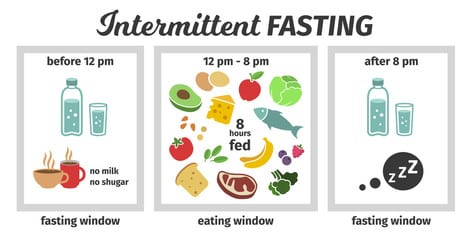One of the most enticing things about intermittent fasting is that you don’t have to restrict what you eat in your eating window. If you really want, you can have all the sweets and refined carbs your heart desires, and you’ll still reap the benefits from your fasting window.
But if that sounds too good to be true, you may be on to something. Intermittent fasting has so many health benefits, and it seems a shame to lose the momentum you worked so hard for during your fast.
So if you want to take your intermittent fasting plan to a whole new level, consider making the following changes.
ADD Coffee
Coffee contains very few calories and won’t break your fast, so it will add some interest to your fasting period. But it also can help feel satiated. And some research suggeststhat coffee may help you lose even more weight while staving off chronic diseases like heart disease and Alzheimer’s.
And for anyone who can’t start their day without a cup of Joe, this is great news. You can continue to fast through the morning while getting a caffeine jolt from your coffee.
TAKE AWAY Sweeteners
Some experts say it’s fine to have zero-calorie sweeteners in your coffee, but it really depends on your goals. If you’re fasting purely for weight loss, a zero-calorie sweetener won’t break your fast. But if you’re trying to improve gut health, most sweeteners will break that fast.
Stevia is one of the only exceptions to this rule, but there’s a catch. You must use pure stevia extract and not a sweetener that’s mixed with dextrose or erythritol. Erythritol won’t break a fast for weight loss, but it will break a fast for gut health.
ADD Collagen
To be very clear, collagen will break your fast, so don’t have it until you’re in your eating window. But consuming collagen shortly after you break your fast has a number of health benefits. Collagen may improve the health of your skin by reducing the dryness that causes wrinkles. It may also help increase muscle mass, relieve joint pain and prevent bone loss. Taking collagen right after a fast offers your body a great way to ease back into a healthy diet.
TAKE AWAY Heavy Meals
When you’re coming out of a fast, your body is in a very sensitive state. Your insulin levels are extremely low and your body won’t respond well to major insulin spikes. Keep in mind that anything you eat after breaking a fast will cause your insulin levels to rise, so try to stay away from really large and decadent meals.
ADD Prebiotics and Probiotics
One of the biggest benefits of the 16:8 and 18:4 fasts is that it can help restore gut health. Harmful bacteria don’t respond to fasts as well as healthy ones, so the longer you fast, the more bad buggies you’ll kill off.
When you’re finally ready to eat again, avoid feeding the bad bacteria with processed foods and refined sugars. Instead, add prebiotics (artichokes are great) and probiotics. After a fast, you’re at a unique advantage to restore your ever-important gut health.
Regardless of what drew you to intermittent fasting in the first place, you’re sure to experience some very desirable side effects that you weren’t even expecting. For example, you may find that you have increased energy, and you may finally be able to defeat alcohol addiction. The fact that you lose a few pounds is just the icing on the cake.
Here’s a list of what you can eat and drink during intermittent fasting.
Water
Water is the most important beverage during intermittent fasting. The hours that you don’t eat, the body uses sugar from your liver for energy. This results in dehydration. So, it’s important to make sure that you replenish the water lost in the process. The colour of your urine will indicate whether you are hydrated or not. The lighter the colour the more water you have in your system. Conversely, the darker the colour the more water you need to drink. Failing to keep yourself hydrated during fast will lead to headaches, dizziness, and fatigue, among many other adverse effects. You must drink at least 8 cups of water in a day although this will vary from person to person.
2. Coffee
Coffee is a low-calorie beverage that doesn’t have to be banned during an intermittent fast. Adding sugars and sweeteners to the coffee, however, proves counterproductive to what you’re trying to achieve. You may have to enjoy bland coffee to make sure that you’re on the right track on your weight loss journey.
3. Avocados
Avocado is a high-calorie fruit. This raises questions as to whether it should be included in intermittent fasting. What’s good about eating avocados when fasting is the fact that avocadoes leave you full. Indulging in avocadoes means that you’ll eat less of other foods and, as a direct result, take in fewer calories. Some sprinkle sugar on avocadoes for sweetness. However, in the context of fasting, adding sugar means adding weight, which isn’t your intended goal.
4. Fish
Dietary guidelines advise you to eat at least 8 ounces of fish a week. This is because of the healthy fats, protein, and vitamin D that you’re guaranteed by eating fish. Fish is also considered a brain food. Discover the fun and varied ways of preparing fish and you’ll have a meal to look forward to on your fish day.
5. Vegetables
Vegetables are required in your diet because of the benefits of high fibre content. High fibre prevents you from having constipation. Constipation is a common problem as a result of sporadic eating. Vegetables high in fibre, such as sprouts and broccoli, also keep you full and reduce the number of meals you eat a day.
6. Potatoes
There seems to be a myth that you need to avoid all white foods when fasting. However, not every white food is your enemy during intermittent fasting. Potatoes are a great source of protein if prepared properly. Deep fat fried chips and deep-fried wedges don’t count as a healthy meal because of the obvious amounts of fat. You can boil or steam your potatoes and find ways to add colour to the dish by including green vegetables.
7. Beans and legumes
Beans and legumes serve as high energy foods. During intermittent fasting, you may experience moments of feeling physically lethargic, particularly in the beginning. Beans and legumes make for a high energy meal that’s low in calories and carbs.
8. Berries
Berries are a popular recommendation during fasting. Berries are so rich in Vitamin C that you get 100% of your daily requirement in just one cup. As a result, berries contribute to the lowering of BMI and the general benefits of a healthy amount of Vitamin C. Prepare your berry shakes for a tasty healthy beverage.
9. Eggs
1 large egg contains 6 grams of protein. This protein is essential for building muscles. Make sure to include boiled eggs in your diet and refrain from frying. Oil is not a recommended ingredient during intermittent fasting.
10. Whole grains
Whole grains such as millet and sorghum are high in fibre and protein. These also speed up your metabolism. This means that your weight loss journey is made easy by these foods. Add nuts such as almonds into your whole-grain meals to benefit from the good fat present in them.
Conclusion
You must speak to your health care practitioner regarding the types of foods that you should take during your intermittent fasting. People respond differently to different food types and intermittent fasting. You’ll have to figure out what works for you the best. Enjoy the food and enjoy the results.





